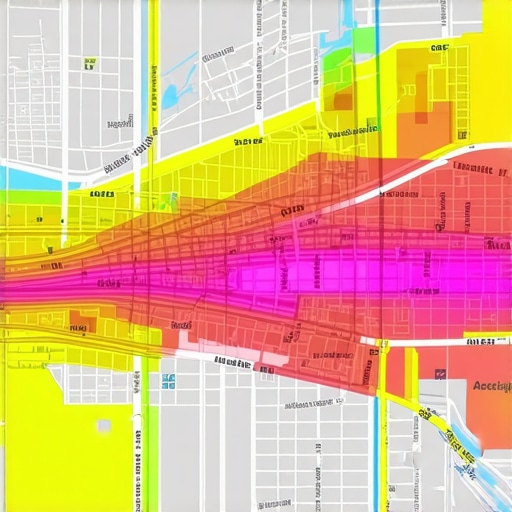Unlocking the Future of Local SEO: Strategic Maps Rank Optimization using GMB Software in 2024
In an era where local search visibility directly correlates with business success, mastering the intricacies of Google Maps ranking becomes paramount. The convergence of innovative GMB software solutions and sophisticated optimization strategies in 2024 offers unparalleled opportunities for local businesses to dominate their markets. As experts in the field, we delve into the most advanced tactics that leverage cutting-edge tools and data-driven insights to elevate your Maps rankings beyond conventional practices.
Why Traditional Optimization No Longer Suffices in a Competitive Landscape
Historically, local SEO relied heavily on basic citation building and keyword stuffing. However, with Google’s evolving algorithms, especially in 2024, these tactics have become obsolete. The modern approach emphasizes authentic customer engagement, comprehensive data analysis, and real-time tracking. GMB software now integrates AI-driven analytics to identify ranking fluctuations, enabling proactive adjustments that were previously impossible. This shift underscores the importance of adopting a holistic, technology-enabled strategy.
Can Geographical Data Analytics Revolutionize Your Maps Rankings?
What are the most effective ways to utilize geospatial data for local SEO dominance?
Advanced geospatial data analytics can reveal hidden patterns in consumer behavior and competitor activities. By integrating these insights with GMB software, businesses can fine-tune their location-specific signals—such as proximity, service area adjustments, and local keyword targeting—to maximize visibility. Techniques like heat mapping and geofencing, supported by GeoGrid tracking, provide granular control over ranking factors.
Harnessing the Power of Real-Time Tracking for Dynamic Optimization
One of the most transformative advancements in 2024 is the integration of real-time tracking within GMB software. This capability allows marketers to monitor fluctuations in local search rankings instantaneously, enabling swift tactical responses. For instance, if a competitor’s ranking improves unexpectedly, data insights can inform immediate adjustments to your local SEO tactics—be it updating Google My Business profiles, managing reviews, or refining local content strategies. The key is a continuous feedback loop that sustains long-term dominance.
Advanced Strategies for Maps Rank Domination Using GMB Software
- Layered Signal Optimization: Combining NAP consistency, review management, and local content with geo-targeted keywords.
- Geo-Enhanced Content Strategies: Developing location-specific content that resonates with local audiences and signals relevance to Google.
- Data-Driven Competitor Analysis: Utilizing analytics to study competitor rankings and identify gaps or opportunities.
- Integrated Tracking and Adjustments: Employing GMB software to track metrics across multiple locations simultaneously, enabling centralized control.
Are there open debates about the ethical boundaries of geospatial tracking in local SEO?
Indeed, the use of advanced geospatial tracking raises questions about privacy and ethical considerations. While these tools enhance competitive advantage, they must be employed responsibly, respecting user privacy and adhering to local regulations. Transparent practices foster trust and sustain long-term growth.
To deepen your understanding of these strategies, explore Ultimate Geogrid Tracking Guide 2024. For ongoing updates and expert insights, consider consulting industry-leading sources such as Moz or Search Engine Journal. Additionally, engaging with professional communities on forums can provide valuable peer feedback and innovative ideas.
As the landscape of local SEO continues to evolve rapidly, embracing advanced GMB software and sophisticated data analytics will be integral to maintaining a competitive edge. For personalized consultation or to share your success stories, contact us today.
Are Your Geospatial Strategies Fully Optimized for Local SEO Dominance?
In the rapidly evolving realm of local search, leveraging sophisticated geospatial analytics has become a game-changer. Beyond basic proximity signals, advanced geospatial data—like consumer movement patterns, demographic overlays, and competitor geofencing—can provide granular insights that significantly enhance your local SEO tactics. Integrating these insights with robust GMB software enables marketers to craft hyper-targeted campaigns, ensuring that your business appears precisely where your potential customers are searching.
For example, heat mapping can reveal underserved neighborhoods or emerging areas of high activity, guiding targeted content and advertising efforts. Geofencing technology allows real-time engagement with users within specific boundaries, creating personalized offers or notifications that boost local relevance. These techniques, supported by GeoGrid tracking, empower businesses to refine their signals and adapt dynamically to competitive shifts, ensuring sustained visibility.
How Can Real-Time Data Transform Your Local Search Strategy?
Real-time tracking isn’t just a luxury—it’s an essential component of modern local SEO. By continuously monitoring your Google Maps rankings and local engagement metrics, you can quickly identify and respond to fluctuations caused by algorithm updates, competitor actions, or seasonal trends. This proactive approach prevents ranking stagnation and keeps your business ahead of the pack.
Moreover, integrating real-time data with machine learning models allows predictive insights, enabling you to anticipate ranking changes before they occur. For instance, if analytics indicate an impending decline in your visibility within a key neighborhood, immediate adjustments—such as updating GMB profiles, managing reviews, or refining local keywords—can be implemented. This ongoing cycle of data collection, analysis, and action creates a resilient, adaptive local SEO framework.
What Are the Ethical Boundaries of Geospatial Tracking in Local SEO?
While advanced geospatial techniques offer undeniable competitive advantages, they also raise important ethical questions about user privacy and data security. Responsible use of geospatial data involves transparency, adherence to local regulations like GDPR or CCPA, and respecting user consent. Overreaching in tracking or targeting can erode trust and lead to reputation damage.
Leading industry voices, such as Moz, emphasize the importance of ethical standards in local SEO practices, urging marketers to balance innovation with integrity (Moz Ethical SEO Guidelines). Implementing privacy-focused strategies not only safeguards your brand but also establishes long-term credibility in your local community.
Interested in elevating your local SEO with responsible geospatial strategies? Discover how Ultimate Geogrid Tracking Guide 2024 can help you navigate complex data landscapes ethically and effectively. For tailored advice or to share your success stories, visit Contact us today.
Leveraging Multi-Dimensional Geospatial Data for Hyper-Targeted Local SEO Campaigns
In the fiercely competitive landscape of local search, simply relying on proximity signals is no longer sufficient. Advanced geospatial analytics enable marketers to decode complex consumer movement patterns, demographic overlays, and competitor geofencing zones. By integrating these multidimensional data streams into GMB optimization workflows, businesses can craft hyper-targeted campaigns that precisely align with the search intent and behavior of their local audiences.
For example, heat maps generated from consumer foot traffic data reveal underserved or emerging neighborhoods ripe for targeted promotions. Geofencing technology facilitates real-time engagement, delivering personalized offers to users within specific geographic boundaries, thereby increasing conversion rates. Such sophisticated tactics, supported by tools like GeoGrid tracking, elevate local SEO strategies from generic to highly impactful
Exploring Deep Geospatial Analytics: How Can Multi-Layered Data Drive Hyper-Targeted Local SEO Campaigns?
In the quest for unrivaled local search dominance, deploying multi-dimensional geospatial analytics unlocks nuanced insights into consumer behaviors, demographic shifts, and competitor geofencing. Integrating data streams such as foot traffic heatmaps, socio-economic overlays, and temporal movement patterns within GMB optimization frameworks enables marketers to craft hyper-targeted campaigns that resonate with precise local intents.
By leveraging sophisticated spatial clustering algorithms and AI-driven predictive models, businesses can identify emerging micro-neighborhoods or underserved zones, allowing for strategic resource allocation. For instance, analyzing pedestrian flow data during peak hours can inform the optimal placement of local promotions, while demographic overlays can tailor messaging to specific audience segments, maximizing engagement and conversions.
The Role of Geo-Temporal Analytics in Anticipating Market Shifts
Integrating geo-temporal analytics—combining geographic data with temporal trends—provides a strategic advantage in preempting market dynamics. Sophisticated tools can forecast seasonal variations or event-driven surges in local activity, enabling proactive adjustments in GMB profiles, review strategies, or localized ad campaigns. This predictive approach ensures businesses remain agile amidst fluctuating consumer interests and competitor movements.
For example, analyzing historical foot traffic data aligned with local event calendars can reveal optimal times for promotional pushes, while real-time tracking of competitor activities allows dynamic repositioning of local marketing efforts. Such high-level analytics foster resilience and adaptability in complex local ecosystems.
How Do Ethical Considerations Shape Advanced Geospatial Data Utilization?
What are the best practices to ensure responsible use of geospatial data in local SEO?
Responsible deployment of advanced geospatial analytics necessitates strict adherence to privacy regulations such as GDPR and CCPA, emphasizing transparency and user consent. Employing anonymized, aggregated data sets mitigates privacy concerns while still providing actionable insights. Establishing clear data governance policies and maintaining ethical standards in data collection and usage fortifies brand trust and sustains long-term community relationships.
Leading authorities like Moz advocate for integrating ethical considerations into all facets of local SEO, promoting practices that prioritize user rights and data security (Moz Ethical SEO Guidelines).
Explore how adopting these responsible strategies can elevate your local SEO efforts without compromising integrity by consulting industry resources and thought leaders.
Innovative Tools and Future Directions in Geospatial-Driven Local SEO
Emerging technologies such as 5G connectivity, IoT sensor networks, and AI-enhanced spatial analysis are poised to revolutionize local SEO strategies further. These advancements facilitate real-time, hyper-precise tracking of consumer movement and preferences, enabling businesses to adapt instantaneously to shifting local landscapes.
For instance, IoT-enabled smart signage can interact with passersby based on their proximity and behavior, delivering personalized messages that significantly enhance local engagement. Simultaneously, the integration of 5G networks ensures seamless data transmission, empowering sophisticated analytics platforms to operate at unprecedented speeds and accuracy.
Staying ahead in this rapidly evolving domain requires proactive adoption of these cutting-edge tools and continuous learning from industry pioneers. To harness these innovations for your local SEO strategy, consider engaging with forward-thinking analytics providers and participating in specialized forums dedicated to geospatial tech advancements.
Ready to Elevate Your Local SEO with Next-Level Geospatial Analytics?
By embracing multi-layered geospatial data, ethical practices, and innovative technological solutions, your business can attain unprecedented local visibility and engagement. These sophisticated strategies demand a high level of expertise and strategic foresight—traits that position your brand at the forefront of local search evolution. To unlock these potentials, connect with industry leaders, invest in advanced tools, and cultivate a culture of continuous innovation.
Need tailored guidance or looking to share your success stories? Contact us today to explore how advanced geospatial strategies can transform your local SEO landscape.
Expert Insights & Advanced Considerations
1. Integrate Multi-Source Geospatial Data for Precision Targeting
Utilizing diverse geospatial datasets, including foot traffic, socio-economic overlays, and temporal movement patterns, enables hyper-local precision. This multi-layered approach enhances the relevance of your Maps rankings and drives highly targeted local campaigns.
2. Embrace Ethical Geospatial Tracking to Build Trust
Responsible use of geospatial analytics, with strict adherence to privacy regulations like GDPR and CCPA, fosters trust and sustains long-term engagement. Transparency about data collection practices is crucial for maintaining credibility in local SEO efforts.
3. Leverage Real-Time Analytics for Dynamic Optimization
Constant monitoring of ranking fluctuations allows for immediate tactical adjustments, ensuring your business remains resilient against algorithm shifts and competitive moves. Real-time insights facilitate proactive rather than reactive SEO strategies.
4. Use Geo-Temporal Analytics to Anticipate Market Trends
Forecasting seasonal or event-driven surges in local activity enables preemptive optimization of your GMB profiles and content strategies, giving you a competitive edge in local search results.
5. Integrate AI-Driven Predictive Models for Future-Proofing
Employing AI and machine learning to analyze trends and predict ranking changes ensures your local SEO strategy adapts seamlessly to evolving algorithms and consumer behaviors, securing long-term dominance.
Curated Expert Resources
- Moz SEO Blog: Offers authoritative insights into ethical SEO practices and industry standards.
- Search Engine Journal: Provides cutting-edge updates and in-depth analysis of local SEO innovations.
- Google’s Official Guidelines: Ensures compliance with privacy laws and best practices in geospatial data utilization.
- GeoGrid Tracking Guide: Deep dives into advanced geospatial analytics techniques for local search optimization.
- Industry Forums & Communities: Peer-reviewed insights and case studies from seasoned local SEO professionals.
Final Expert Perspective
In the rapidly evolving arena of local SEO, mastering multi-dimensional geospatial analytics and ethical data practices is paramount for sustained success. The strategic integration of advanced tools, real-time insights, and predictive models positions your business at the forefront of local search dominance in 2024. To deepen your expertise and stay ahead of the curve, consider engaging with industry-leading resources and consulting seasoned professionals. For tailored guidance or to share your success stories, contact us today.



![5 Ways to Shrink Your Local Proximity Gap in 2026 [Audit]](https://geogridranker.com/wp-content/uploads/2026/02/5-Ways-to-Shrink-Your-Local-Proximity-Gap-in-2026-Audit.jpeg)
Megan Carter
This article offers a compelling glimpse into how geospatial data and AI-driven analytics are shaping the future of local SEO in 2024. I’ve personally seen how integrating heat maps and real-time tracking can significantly improve local visibility—especially in competitive markets where small adjustments can make a big difference. One challenge I’ve encountered is balancing innovative tracking with respecting user privacy. It’s crucial to stay within the bounds of regulations like GDPR and CCPA, which the article rightly emphasizes.
What strategies have others found effective for transparent data collection that builds trust without sacrificing competitive edge? I believe that as we leverage these advanced tools, maintaining ethical standards will be key to sustaining long-term growth. Overall, embracing these technological advancements feels like the right move for any serious local business aiming for dominance in their area, but it’s important to do so responsibly. Would love to hear others’ insights on creating this balance.